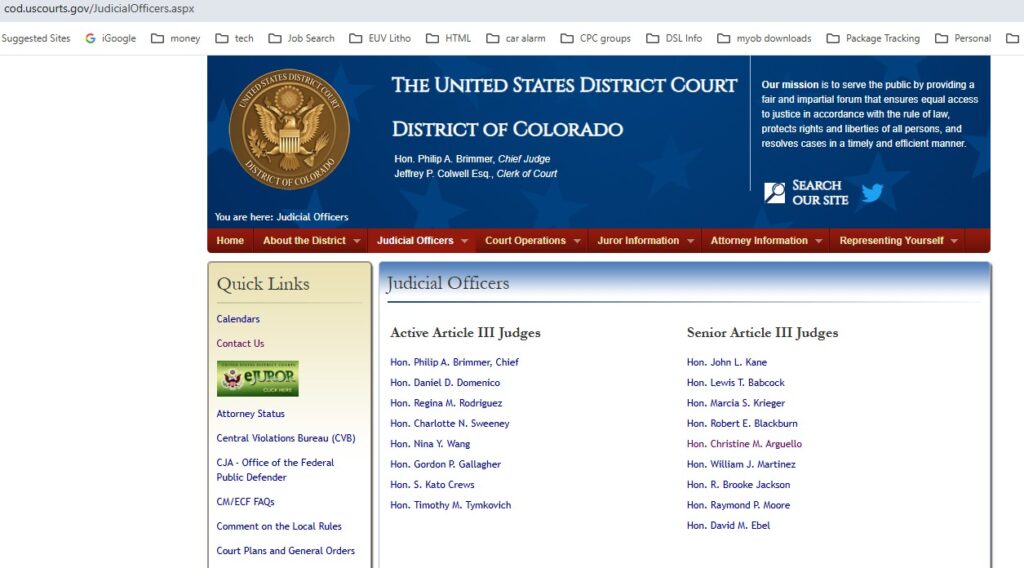US Supreme court June 28th 2024.
22–451 June 28th, 2024 Federal Case number 22–451 in Loper Bright Enterprises v. Raimondo and Relentless, Inc. v. Department of Commerce that all courts shall no longer function as administrative law courts. https://www.supremecourt.gov/opinions/23pdf/22-451_7m58.pdf
By a six to three decision, abuse of Administrative law is henceforth illegal and ALL courts must convene under Article 3 of the U.S. Constitution.

The Chevron doctrine is invalid. Federal and state agencies can no longer cherry pick data for any preferred political agenda.
Stare decisis must be vertical to the Constitution, not horizontal. This is because any other case can’t be guaranteed to have enough similarities to warrant use unless the Judge and counsel on both sides have read case transcripts, exhibits and final ruling.
Also Article 6 Clause 2 of US constitution. This Constitution, and the Laws of the United States which shall be made in Pursuance thereof; and all Treaties made, or which shall be made, under the Authority of the United States, shall be the supreme Law of the Land; and the Judges in every State shall be bound thereby, any Thing in the Constitution or Laws of any State to the Contrary notwithstanding.
10th circuit courts already embraced Loper Bright.

Four cases as of March 1st 2025 have been sent from the US Supreme Court back to Circuit Court because of use of illegal administrative law.
22-863 DIAZ-RODRIGUEZ, RAFAEL V. GARLAND, ATT’Y GEN.
The petition for a writ of certiorari is granted. The
judgment is vacated, and the case is remanded to the United
States Court of Appeals for the Ninth Circuit for further
consideration in light of Loper Bright Enterprises v. Raimondo,
603 U. S. ___ (2024).
22-868
BASTIAS, ARIEL M. V. GARLAND, ATT’Y GEN.
The petition for a writ of certiorari is granted. The
judgment is vacated, and the case is remanded to the United
States Court of Appeals for the Eleventh Circuit for further
consideration in light of Loper Bright Enterprises v. Raimondo,
603 U. S. ___ (2024).
22-1246
EDISON ELEC. INST., ET AL. V. FERC, ET AL.
The petition for a writ of certiorari is granted. The
judgment is vacated, and the case is remanded to the United
States Court of Appeals for the District of Columbia Circuit for
further consideration in light of Loper Bright Enterprises v.
Raimondo, 603 U. S. ___ (2024).
24–5006. Jason Steven Kokinda, Petitioner v. United States. On
petition for writ of certiorari to the United States Court of Appeals for
the Fourth Circuit. Motion of petitioner for leave to proceed in forma
pauperis and petition for writ of certiorari granted. Judgment vacated,
and case remanded to the United States Court of Appeals for the
Fourth Circuit for further consideration in light of Loper Bright Enterprises
v. Raimondo, 603 U. S. ––– (2024).
24–92. Kwok Sum Wong, Petitioner v. Merrick B. Garland, Attorney
General. On petition for writ of certiorari to the United States
Court of Appeals for the Second Circuit. Petition for writ of certiorari
granted. Judgment vacated, and case remanded to the United States
Court of Appeals for the Second Circuit for further consideration in
light of Loper Bright Enterprises v. Raimondo, 603 U. S. ––– (2024).
The 22–451 June 28, 2024 U.S. Supreme Court Loper Bright ruling now
forbids this abuse and reverts back to the U.S.
Constitution. Administrative law is illegal and ALL courts convene as
Article three of the US Constitution. The Chevron doctrine is invalid.
Federal and state agencies can no longer cherry pick data for their false
agenda. Stare decisis must be vertical to the constitution not lower or
sideways. This is because any other case can’t be guaranteed to have
enough similarities to warrant use unless the Judge and each counsel
have read those case transcripts, exhibits and final ruling in a Six to
Three decision.
Because this is an inferior Court to the U.S. Supreme Court it must limit
itself to stare decisis of case law precedent extending vertically back up
to the U.S. Constitution. Stare decisis is, of course, a doctrine or policy
of following rules or principles laid down in previous judicial decisions
unless they contravene the ordinary principles of justice.
Horizontal stare decisis is unreliable because it can never be guaranteed
to be the exact same case with the same history without studying the
transcripts and exhibits of the previous case. This is like comparing
Apples to Oranges; they are both fruit, but different. This court is
therefore, obligated to convene as a Court under Article III of the US
Constitution.